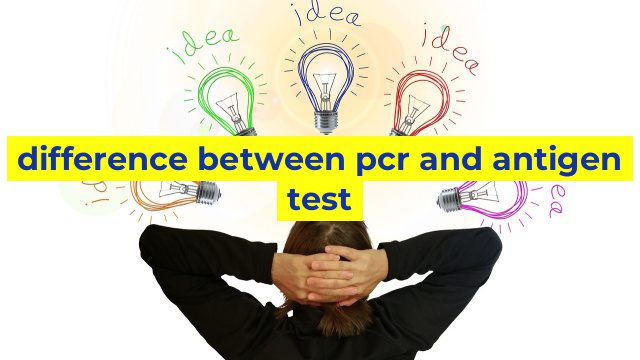The Difference between PCR and Antigen Tests for COVID-19
Introduction
The COVID-19 pandemic has brought about an increased demand for diagnostic tests. Two of the most commonly used tests are the PCR (polymerase chain reaction) and antigen tests. Both tests work by detecting the presence of the SARS-CoV-2 virus which causes COVID-19. However, there are significant differences in how these tests work, their accuracy, and their turnaround times.
PCR Tests
PCR tests are molecular tests that detect the viral RNA in a sample taken from a patient. The sample can be taken from a nasal or throat swab, or from saliva. The test works by amplifying any viral RNA present in the sample, making it easier to detect. PCR tests are highly accurate, with a sensitivity of up to 99%. This means that they are very good at picking up even small amounts of the virus. However, PCR tests can take several hours to produce a result, and require specialized laboratory equipment and trained technicians.
Antigen Tests
Antigen tests, on the other hand, detect viral proteins instead of viral RNA. The sample is taken in the same way as for a PCR test. However, instead of amplifying the viral RNA, the test looks for specific viral proteins. Antigen tests are cheaper and faster than PCR tests, with results available in as little as 15-30 minutes. However, antigen tests are less accurate than PCR tests, with a sensitivity of around 80-90%. This means that they are more likely to produce false negative results and miss infections.
Which Test Should You Get?
The type of test you should get depends on several factors, including the reason for testing, the availability of tests, and the urgency of the situation. PCR tests are generally recommended for symptomatic individuals and those with a higher risk of exposure, such as healthcare workers. Antigen tests are a good option for people who need a rapid test result, such as for travel or to attend an event. However, a negative antigen test result should be confirmed with a PCR test if there is still suspicion of COVID-19.
Conclusion
Both PCR and antigen tests have their strengths and weaknesses. PCR tests are highly accurate but require a longer turnaround time and specialized equipment, while antigen tests are faster but less accurate. The choice of test should be based on the situation and the urgency of the need for testing. Regardless of which test is used, it is important to continue following all public health guidelines to prevent the spread of COVID-19.
Table difference between pcr and antigen test
| Parameter | PCR Test | Antigen Test |
|---|---|---|
| Test Type | Molecular Test | Antigen Test |
| Sample Collection | Swab (nasopharyngeal or oropharyngeal) | Swab (nasopharyngeal or oropharyngeal) |
| Test Result Time | Average of 1-2 days | Average of 15-30 minutes |
| Accuracy | Highly accurate (less likely to have false negatives) | Somewhat less accurate than PCR (more likely to have false negatives), but less expensive |
| Sensitivity | Higher sensitivity (can detect very low amounts of virus) | Lower sensitivity (more likely to miss early or asymptomatic infections) |
| Cost | Expensive, usually covered by insurance | Less expensive, often not covered by insurance |
| Purpose | Generally used to diagnose active COVID-19 infections | Generally used for rapid screening and diagnosis of active COVID-19 infections in high-risk areas or settings |


